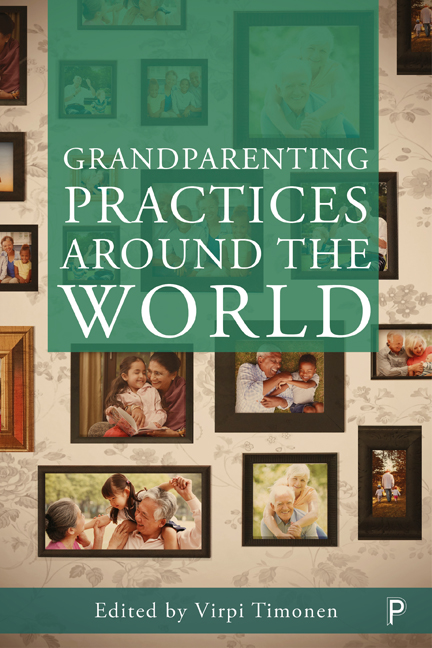Book contents
- Frontmatter
- Contents
- List of figures and tables
- List of abbreviations
- Notes on contributors
- one Introduction: widening the lens on grandparenting
- PART 1 The demographic and welfare-state contexts of grandparenting
- PART 2 Grandparenting in contexts of economic and societal development
- PART 3 Transnational grandparenting
- PART 4 Gender, intersectionalities and grandparenting
- PART 5 Grandparental roles, agency and influence
- Index
twelve - Can Chinese grandparents say no? A comparison of grandmothers in two Asian cities
Published online by Cambridge University Press: 22 April 2022
- Frontmatter
- Contents
- List of figures and tables
- List of abbreviations
- Notes on contributors
- one Introduction: widening the lens on grandparenting
- PART 1 The demographic and welfare-state contexts of grandparenting
- PART 2 Grandparenting in contexts of economic and societal development
- PART 3 Transnational grandparenting
- PART 4 Gender, intersectionalities and grandparenting
- PART 5 Grandparental roles, agency and influence
- Index
Summary
Introduction
This chapter interrogates two dominant research constructs found in studies on Chinese grandparents providing childcare to grandchildren, namely cultural obligation and intergenerational reciprocity (Chen, 2006; Fei, 1982, 1992; Wu and Sun, 2003). The prominence of these two constructs could be attributed to their relationship to the Confucian value of filial piety, which governed family relationships in China for thousands of years. In the Confucian system, both the roles and duties of family members are connected through mutual interdependence over the life course (Hwang, 1999). Chinese grandparents are portrayed as ‘enjoying family happiness’ and caregiving is considered as a willing exchange for the help they receive from their children because Chinese grandparents tend to consider the welfare of the family, particularly their desire to chuan zhong jie dai (maintain the family line), before their own interests (Chen, 2006; Fei, 1982, 1992; Low and Goh, 2015). Research findings tend to report positive physical and mental health outcomes for grandparents caring for grandchildren (Guo et al., 2008; Chen et al., 2011), alluding to grandchild care as contributing towards intergenerational solidarity and intergenerational reciprocal caregiving.
Notwithstanding their popularity and contributions, we question whether cultural obligation and intergenerational reciprocity have unwittingly silenced the diverse voices of Chinese older persons with regards to grandchild care. Recent studies have begun to report insights into intergenerational tension in Asian families, particularly highlighting the challenges faced by grandparents who provide informal childcare (Goh, 2009; Goh et al., 2016; Low and Goh, 2015; Teo et al., 2006; Xu et al., 2017). These tensions were felt acutely, particularly by grandmothers, as the task of intensive and hands-on grandchild care provision falls overwhelmingly on women – hence our focus on grandmothers in this chapter. We agree with Timonen and Doyle (2012) that grandparental agency has remained an underappreciated and undertheorised aspect of grandparenting. That is, instead of examining the provision of childcare as Chinese grandmothers’ response to cultural obligations and contributing to enhanced intergenerational reciprocity, grandmothers should be viewed as strategic agents who actively shape their relationships with adult children and grandchildren through generating different types of connections with them, in which providing childcare could be one of the agentic decisions.
- Type
- Chapter
- Information
- Grandparenting Practices around the World , pp. 233 - 252Publisher: Bristol University PressPrint publication year: 2018



